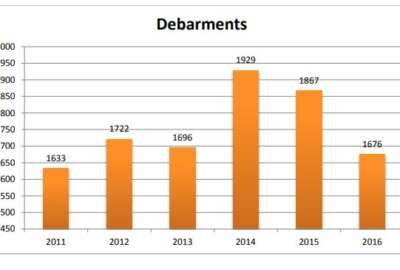To listen to the Federal Newscast on your phone or mobile device, subscribe in PodcastOne or Apple Podcasts. The best listening experience on desktop can be found using Chrome, Firefox or Safari.
- Agencies and contractors are doing more to avoid using the suspension and debarment process. The number of vendors suspended, proposed for debarment or debarred in fiscal 2018 dropped for a fourth year in a row. The Interagency Suspension and Debarment Committee’s annual report to Congress showed agencies instead turned to administrative agreements and pre-notice letters to address vendor problems. The departments of Housing and Urban Development, Transportation and the Navy accounted for 43% of the 480 total suspensions. HUD, the Army, the Navy and the Department of Homeland Security accounted for almost half of the more than 1,300 debarments. (Interagency Suspension and Debarment Committee)
- The Army is launching another set of housing satisfaction surveys. The questions will be emailed to Army-managed housing Thursday and to privatized housing residents on Nov. 12. The purpose is to receive firsthand accounts of what soldiers and their families find important in Army housing, and to gauge satisfaction with property management services. The surveys come in the wake of reports of mice, mold, lead paint and other issues in privatized military housing. (U.S. Army)
- A bill that would give federal employees bonuses for flagging agency programs with more money than they can spend took a step forward in the Senate. The Homeland Security and Governmental Affairs Committee passed the Bonuses for Cost-Cutters Act, which would allow agency inspectors general to award up to $10,000 for reporting surplus or unneeded agency funds. IG offices can already award bonuses to employees who spot agency fraud waste or abuse. (Federal News Network)
- The Air Force wants to use some of its 2021 funding to build a digital foundation. That means investing in needed IT infrastructure and cloud architecture. Air Force Chief of Staff Gen. David Goldfein said the Air Force plans to spend $9 billion over the next five years on the initiative. Another $9 billion will go to offensive and defensive space capabilities. Goldfein said without a solid digital foundation, the Air Force will not be able to take advantage of things like artificial intelligence and machine learning. (Federal News Network)
- The Environmental Protection Agency has become the second agency in as many weeks to propose a new process to speed up the resolution of disputes. Like the Justice Department and HUD did with the False Claims Act, EPA is proposing to use either alternative dispute resolution, a hearing before its appeals board, or more timely judicial review to settle permit disagreements. The agency said the new process is designed to simplify the review process, expedite permitting and let parties challenge EPA’s permits in court more quickly. (Environmental Protection Agency)
- The 401(k) contribution limit is going up next year for federal employees. That means participants in the Thrift Savings Plan can contribute up to $19,500 next year, compared to the current limit of $19,000. The catch-up contribution for TSP participants age 50 and older is also going up. Those participants can contribute up to $6,500 in catch-up contributions next year. The current catch-up limit is $6,000. (IRS)
- A bipartisan group of senators is making good on their promise to stop the Thrift Savings Plan from moving to a new international index. The Taxpayers and Savers Protection Act, co-sponsored by Sens. Marco Rubio (R-Fla.) and Jeanne Shaheen (D-N.H.), would prevent the TSP from moving to an index that tracked emerging markets, including China. Senators said they don’t want federal retirement assets to be exposed to Chinese interests. The Federal Retirement Thrift Investment Board is reconsidering its original plans for the fund but hasn’t made a final decision. Rep. Mark Meadows (R-N.C.) plans to introduce a House companion bill. (Sen. Jeanne Shaheen)
- The Department of Veterans Affairs said veterans can now access some of their VA health records on their iPhones. Veterans will be able to see their medical information from the VA and other participating providers in one place on the Health app of their phones. Users will get a notification when their data is updated. VA developed the capability through the Veterans Health Application Programming Interface. The Veterans Health API now has 2,000 users. VA said it will partner with other organizations to bring these features to other mobile devices. (Department of Veterans Affairs)
- The Office of Naval Research is opening a new hub in Melbourne, Australia. ONR’s international arm, Naval Research Global, is charged with providing science and technology from around the world for current and future naval challenges. Recent collaborations between the U.S. and Australia include projects on quantum technology, nanotechnology, human systems and machine learning. Naval Research Global has other offices in Tokyo and Singapore. (Office of Naval Research)
- A federal appeals court has agreed to hear arguments from Bowe Bergdahl, the former Army sergeant who was charged with desertion and misbehavior before the enemy in Afghanistan. The U.S. Court of Appeals for the Armed Forces said it will consider Bergdahl’s claim that his case was tainted by undue command influence. His attorneys allege the proceedings were affected by negative comments President Donald Trump made about Bergdahl. (U.S. Court of Appeals for the Armed Forces)
- The Project on Government Oversight said now is the time to start talking about comprehensive changes to intelligence community whistleblower law. POGO wrote to leaders of the House and Senate Intelligence committees with 11 proposals to change IC whistleblower laws. The organization says Congress should give intelligence whistleblowers authority to have an independent review board reverse agency actions. POGO suggests whistleblowers have permission to make disclosures to any committee in Congress. (Project on Government Oversight)
- The General Services Administration has stood up an artificial intelligence community of practice ahead of a bill that would require the agency to create one. The group will oversee the government’s rollout of AI technology, including robotic process automation, machine learning, and natural language processing. Federal Chief Information Officer Suzette Kent and Anil Cheriyan, the head of GSA’s Technology Transformation Service, will serve as executive sponsors of the group. GSA made the announcement just before the Senate Homeland Security and Governmental Affairs Committee passed the AI in Government Act, which would task the agency with creating a similar organization. (General Services Administration)
Copyright
© 2024 Federal News Network. All rights reserved. This website is not intended for users located within the European Economic Area.




